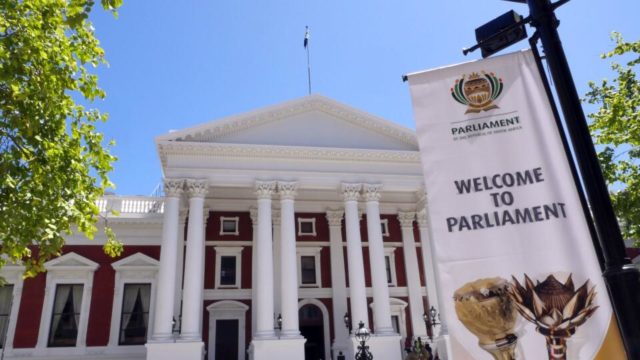Only a minority of South Africans say they trust the president (38%) and Parliament (27%) “somewhat” or “a lot”.
CARRIED out shortly before the July riots, the findings from the most recent Afrobarometer survey show that South Africans’ trust in a variety of institutions is at its lowest since first being measured by Afrobarometer in 2006.
Subsequent to the riots, trust in elected representatives, which is especially weak, would have dipped even lower. With judgment reserved in the Independent Electoral Commission application to the Constitutional Court to postpone the local government elections, two-thirds of respondents would be willing to forego elections if a non-elected government could provide improved security and better services.
The Afrobarometer team in South Africa, led by the Institute for Justice and Reconciliation and Plus 94 Research, interviewed 1,600 adult South Africans in May and June. The key findings were:
- Trust in nearly all institutions is low – and declining. Only media broadcasters, both independent (63%) and government (61%), and the Department of Health (56%) – the data was collected prior to an investigation into alleged corruption implicating then Minister of Health Zweli Mkhize – enjoy the trust of a majority of citizens.
- Only a minority of South Africans say they trust the president (38%) and Parliament (27%) “somewhat” or “a lot”. For the first time in Afrobarometer surveys, only a minority (43%) express trust in courts of law.
- Only about one in three citizens (36%) trust the Electoral Commission of South Africa, with trust levels particularly low among younger respondents. Slightly more (42%) trust the Public Protector.
- Trust in both the ruling ANC (27%) and opposition parties (24%) continues to decline. Trust in the ANC is especially low among younger and more educated respondents.
- Two-thirds (67%) of South Africans would be willing to give up elections if a non-elected government could provide security, housing, and jobs. Nearly half (46%) say they would be “very willing” to do so, with higher levels of support among younger and more educated respondents.
Trust in the president dropped by half, from 70% to 34%, between the 2006 survey, conducted during the Mbeki presidency, and the 2015 survey, during the Zuma presidency, and has recovered only slightly, to 38%, during Ramaphosa’s tenure, said Afrobarometer.
’’The proportion who trust the president ’a lot’ has declined significantly, from almost half (47%) of respondents in 2006 to just one-fifth (21%) in 2021. In other words, the Ramaphosa presidency, facing a pandemic and an economic crisis, has substantially less social capital at its disposal than Mbeki had in 2006, or even than Zuma had in 2011.’’
Levels of trust in Ramaphosa are similar in urban and rural areas and are slightly higher among men (41%) than among women (35%). Less educated citizens express greater trust in the president than those with more schooling.
A clearer division is visible from a generational perspective: Only about one-third of 18 to 35 year olds express trust in the president, compared to roughly half of those above age 45.
“Like trust in the president, popular trust in Parliament has declined. Majorities in 2006 (54%) and 2011 (56%) indicated that they trusted members of Parliament ’somewhat’ or ’a lot’. Since then, this proportion has fallen steadily, reaching just 27% in the most recent survey,’’ said Afrobarometer.
“The 2021 survey was the first instance where a majority (53%) of respondents indicate little or no trust in the judiciary. While the courts are still considered more trustworthy (43%) than Parliament and the president, the share of respondents who trust the courts ’just a little’ or ’not at all’ has been climbing steadily since 2011.
“Trust in opposition parties has never exceeded 40% and now rests at just 24%, suggesting that opposition parties have failed to present an attractive alternative to the ruling party.
“Trust in the ruling party is stronger in rural areas (32%) than in cities (24%) and among men (29%) compared to women (24%). Trust levels increase with respondents’ age and poverty levels.
’“They decrease sharply with respondents’ education level, ranging from 60% of those with no formal schooling to just 18% of those with post-secondary qualifications.
“South Africans’ low levels of trust in public institutions signal a weakening of democratic norms. Over two decades of democracy, poverty, unemployment, inequality, and crime have remained prominent problems as the promise of South Africa’s democracy has yet to introduce substantial material improvements for the majority of people. In this context, a growing majority (67%) of South Africans would be willing to forego elections if a non-elected government could provide security, jobs and housing.
“This has been the majority view in all survey rounds since 2006, but in 2021, amid the health and economic crises presented by Covid-19, the proportion who say they would be ’very willing’ to give up regular elections for an unelected but efficient government has shot up to nearly half (46%).’’
In its conclusion, Afrobarometer said: “A precipitous decline of public trust in the state, elected representatives, and oversight institutions may be one of Zuma’s lasting legacies.
“Ramaphosa has succeeded in reversing the decline in public trust in the presidency, but only marginally, and this improvement has not extended to other institutions. Trust in independent and government broadcasters far outpaces trust in most state institutions, indicating that South Africans look to the media to help ensure government accountability.
“Amid increasing mistrust of public institutions, the riots in July may have been a warning. The government will need to improve its delivery of services, provide greater social protection, and demonstrate a determination to punish corruption to have any chance of rebuilding trust between citizens and their state.’’








